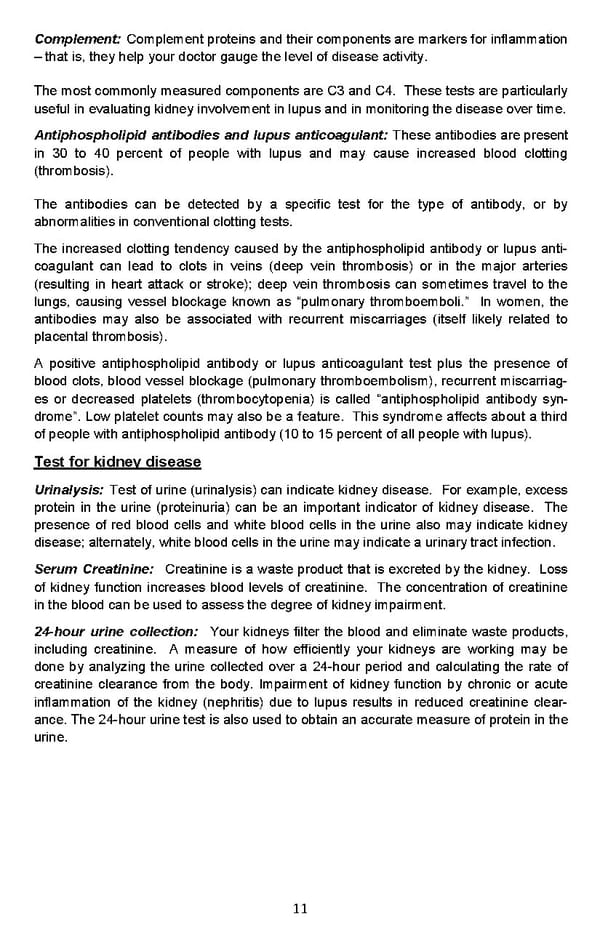Complement: Complement proteins and their components are markers for inflammation – that is, they help your doctor gauge the level of disease activity. The most commonly measured components are C3 and C4. These tests are particularly useful in evaluating kidney involvement in lupus and in monitoring the disease over time. Antiphospholipid antibodies and lupus anticoagulant: These antibodies are present in 30 to 40 percent of people with lupus and may cause increased blood clotting (thrombosis). The antibodies can be detected by a specific test for the type of antibody, or by abnormalities in conventional clotting tests. The increased clotting tendency caused by the antiphospholipid antibody or lupus anti- coagulant can lead to clots in veins (deep vein thrombosis) or in the major arteries (resulting in heart attack or stroke); deep vein thrombosis can sometimes travel to the lungs, causing vessel blockage known as “pulmonary thromboemboli.” In women, the antibodies may also be associated with recurrent miscarriages (itself likely related to placental thrombosis). A positive antiphospholipid antibody or lupus anticoagulant test plus the presence of blood clots, blood vessel blockage (pulmonary thromboembolism), recurrent miscarriag- es or decreased platelets (thrombocytopenia) is called “antiphospholipid antibody syn- drome”. Low platelet counts may also be a feature. This syndrome affects about a third of people with antiphospholipid antibody (10 to 15 percent of all people with lupus). Test for kidney disease Urinalysis: Test of urine (urinalysis) can indicate kidney disease. For example, excess protein in the urine (proteinuria) can be an important indicator of kidney disease. The presence of red blood cells and white blood cells in the urine also may indicate kidney disease; alternately, white blood cells in the urine may indicate a urinary tract infection. Serum Creatinine: Creatinine is a waste product that is excreted by the kidney. Loss of kidney function increases blood levels of creatinine. The concentration of creatinine in the blood can be used to assess the degree of kidney impairment. 24-hour urine collection: Your kidneys filter the blood and eliminate waste products, including creatinine. A measure of how efficiently your kidneys are working may be done by analyzing the urine collected over a 24-hour period and calculating the rate of creatinine clearance from the body. Impairment of kidney function by chronic or acute inflammation of the kidney (nephritis) due to lupus results in reduced creatinine clear- ance. The 24-hour urine test is also used to obtain an accurate measure of protein in the urine. 11
 Living Well With Lupus Facts Booklet Page 10 Page 12
Living Well With Lupus Facts Booklet Page 10 Page 12